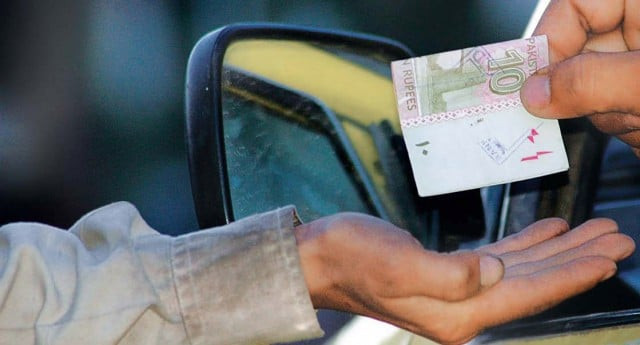Organised network: Beggar mafia promoting crime in the city
Children are kidnapped and fed to this multi-million-rupee verboten industry

Karachi, a metropolis that is home to a population of more than 20 million people, is also a city where various groups of organised crime find it easy to hide and operate in plain sight.
Recently, the Sindh government was moved to consider a legislation against one such group, called the beggar mafia, that is allegedly responsible for various incidents of street crime, drug and child trafficking across the city.
Earlier this year, after multiple reports, the police, in collaboration with different agencies, had also started a joint investigation to launch a crackdown on this mafia; leading to the arrest of several beggars.
It was believed that the children accompanying the arrested adults weren’t their own, and rather kidnapped and fed to this multi-million-rupee verboten industry of professional beggary.
In the aftermath of the crackdown, the number of beggars thinned as the industry regrouped, but now it seems the mafia has once again returned, leading to reports of increased street crime.
According to a survey by The Express Tribune, major markets in Karachi including Boulton Market, Jamia Cloth, Saddar, Tariq Road, Liaquatabad, Karimabad, Defense, Clifton, and major shopping malls, signals are highways, are occupied by these beggars who remain present there individually or in groups.
Read More: CTP gears up operation against beggars
“They [beggars] are of all ages, ranging from elderly men and women to children, who are often plucked from their families and tortured into begging,” said Adnan Khan, a resident of Gulshan-e-Iqbal.
“Some of these beggars are drug addicts, and can be seen openly abusing chemicals like ice and heroin on street corners,” he added.
According to Malik Zafar, a resident of Karachi’s Clifton area, beggars are known to steal motorcycle parts, petrol and car side mirrors, but the government doesn’t take any strict action against them.
“The times that they are caught, they are handed over to social organisations and NGOs, but eventually make it back to the streets,” said Zafar. Naeem Khan, a local social worker, said there was no effective law against these mafias. A force was formed to crack down on beggars, which appears to be inactive now.
“Most of the beggars do not have identity documents, which makes it difficult to take action against them, even when they are allegedly involved in illegal activities,” told Khan.
Speaking in the regard, Senior Superintendent of Police (SSP) Central Ghulam Murtaza Tabassum said that action against beggars is not taken by Anti-Beggar Force but by local police.
These beggars are handed over to social institutions and legal action is taken against the beggars who are involved in any crime.
On the other hand, according to Chhepa Foundation head Ramzan Chhepa, the government needs to enact effective legislation to curb beggars and create shelter homes for them, where they can be housed and taught skills so that they can earn a living and become contributing members of society. “The government also needs to take steps for the rehabilitation of drug addicts,” he added.
While on the other hand, Reshma, a beggar from Karachi’s Teenhatti area, said that she belongs to Hala. “We come to the city to make a living through begging, because unlike our villages, people here can afford to give.
But the police keep harassing us and framing us for crimes,” lamented the woman, while speaking to The Express Tribune.


















COMMENTS
Comments are moderated and generally will be posted if they are on-topic and not abusive.
For more information, please see our Comments FAQ